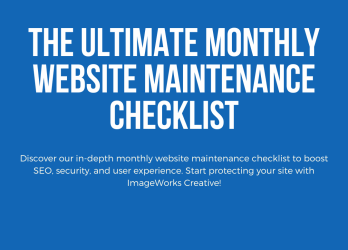Essential Web Maintenance Plans for Success

In today's digital landscape, web maintenance plans are not just optional; they are vital to the success and longevity of any online presence. A well-maintained website ensures that your business stays relevant, secure, and operates at peak performance. Regular maintenance includes updating content, ensuring compatibility with various browsers and mobile devices, and keeping up with the latest SEO standards to maintain visibility in search engine rankings.
Just as a car needs regular servicing to run smoothly, a website requires consistent attention to function properly. Neglecting this can lead to issues such as slow loading times, broken links, or even security breaches, which not only impact user experience but can also damage a brand's reputation. By investing in a comprehensive web maintenance plan, you safeguard your site against potential threats and downtime, ensuring a seamless experience for your visitors.
At ImageWorks Creative, we recognize the importance of keeping your website in top condition. Our tailored maintenance plans are designed to address the specific needs of your business, ensuring your online platform remains an asset that supports your growth. Schedule a free consultation today and let us help you keep your website as dynamic and engaging as your business itself.
Key Components of Effective Web Maintenance Plans

Effective web maintenance plans consist of several key components that work together to keep a website functional, secure, and up-to-date. One of the primary aspects is regular updates, which involve refreshing website content, updating software and plugins to their latest versions, and ensuring all scripts are running smoothly. This not only helps with user engagement by providing fresh content but also protects against vulnerabilities that could be exploited by hackers.
Another critical component is website backups. Regular backups protect the website against data loss due to hardware failure, cyber-attacks, or accidental deletions. These should be performed frequently and stored securely off-site for added protection. Additionally, monitoring website performance is essential to identify and address any issues promptly, such as broken links, page load delays, or other technical problems that could affect the user experience or SEO rankings.
Security checks are also a cornerstone of web maintenance. They involve scanning for malware, implementing firewalls, and ensuring that security protocols are up to date to prevent unauthorized access. Lastly, SEO optimization is an ongoing process within web maintenance that includes refining keywords, meta descriptions, and other on-page elements to improve search engine ranking and visibility.
By incorporating these components into a web maintenance plan, businesses can ensure that their website remains a powerful tool for connecting with their audience and achieving digital success.
Strategies for Selecting the Right Web Maintenance Services
Selecting the right web maintenance services requires a strategic approach to ensure that the specific needs and goals of a business are met. The first strategy is to conduct a comprehensive website audit to understand the current state of the site, including its structure, content, user experience, and any technical issues that need to be addressed. This assessment forms the basis for identifying the services that will have the most impact.
Another strategy is to prioritize services based on criticality. For example, businesses that handle sensitive customer information may place a higher emphasis on security services, such as regular security audits and the implementation of advanced security measures. On the other hand, e-commerce sites might focus more on performance optimization to ensure fast loading times and a smooth checkout process, which are crucial for customer retention and sales.
It's also important to consider the scalability of the web maintenance services. As a business grows, its website will require more resources and advanced features. Therefore, choosing a service provider that can accommodate growth and offer flexible maintenance packages is key. Additionally, businesses should look for service providers that offer comprehensive reporting and analytics, which will help them track the success of their web maintenance efforts and make data-driven decisions.
Ultimately, a successful strategy for selecting web maintenance services will align with the business's long-term digital strategy and budget while ensuring the website continues to serve as a vital asset in the ever-evolving digital landscape.
The Impact of Regular Maintenance on Website Security

Regular maintenance is a cornerstone in safeguarding a website against the myriad of security threats present in the digital world. One of the most critical components is the regular updating of software and plugins. Outdated systems are prime targets for cybercriminals, and timely updates close vulnerabilities that could be exploited for unauthorized access or data breaches.
In addition to updates, regular scans for malware and other malicious threats are vital. These scans can detect and remove any potential threats before they cause harm. Incorporating strong firewalls and intrusion detection systems as part of web maintenance plans can also significantly reduce the risk of cyberattacks.
Password policies and user permissions should be reviewed and tightened during routine maintenance. Implementing strong password requirements and two-factor authentication can greatly enhance security, while proper management of user permissions ensures that only authorized individuals have access to sensitive areas of the website.
Backup protocols are another important aspect of website security. Regular, encrypted backups protect against data loss in the event of an attack, ensuring that a website can be quickly restored to its previous state without significant downtime or data compromise.
Maintaining website security is an ongoing challenge that requires vigilance and a proactive approach. Regular maintenance not only fixes known issues but also helps in the early detection and prevention of potential security risks, safeguarding the website and its users from the continuously evolving threat landscape.
Measuring the ROI of Your Web Maintenance Investment

Measuring the Return on Investment (ROI) of web maintenance is essential for businesses to understand the value derived from their website upkeep efforts. Key performance indicators (KPIs) such as website uptime, page load speed, and user engagement levels are direct metrics that can demonstrate the impact of regular maintenance. A website that is consistently available and fast to load is likely to retain and convert more visitors, thus increasing revenue and customer satisfaction.
Another indicator of maintenance ROI is the reduction in cybersecurity incidents. By preventing security breaches and ensuring compliance with data protection regulations, businesses can avoid the costs associated with data loss, legal fees, and reputation damage. A secure website also fosters trust with users, which is invaluable for customer loyalty and brand reputation.
Search engine ranking improvements are also a result of meticulous maintenance. Search engines favor websites that offer a great user experience, which includes being mobile-friendly, having updated content, and running smoothly. The resultant higher search rankings drive more organic traffic to the site, thereby potentially increasing sales and conversion rates.
Finally, the longevity and scalability of the website are indicative of a good maintenance program. A well-maintained site will require fewer major overhauls and can grow with the business, reducing the need for costly redesigns or rebuilds. By tracking these metrics over time, businesses can quantify the benefits and justify the investment in their web maintenance plans.
Integrating Web Maintenance with Overall Digital Marketing

Integrating web maintenance plans with overall digital marketing strategies is a pivotal step in ensuring the coherence and effectiveness of a business's online presence. Regular updates to content, themes, and features not only keep a website fresh and relevant but also support SEO efforts by signaling to search engines that the website is active. This can lead to improved search rankings and increased visibility among potential customers.
Furthermore, maintaining a website’s functionality ensures that marketing campaigns run smoothly. For example, if a business is driving traffic through social media ads or email marketing, the landing pages must load quickly and function correctly to capitalize on that traffic and reduce bounce rates. A well-maintained website also allows for the accurate collection of data analytics, which is paramount for understanding customer behavior and refining marketing strategies.
Email marketing campaigns can benefit from updated web content by including links to the latest blog posts or product pages, encouraging repeat visits. Additionally, ensuring that all web forms are functioning properly can increase lead generation opportunities, a crucial element for marketing success.
For businesses looking to leverage their website to the fullest within their digital marketing campaigns, ImageWorks Creative offers expertise in seamlessly blending web maintenance with comprehensive marketing strategies. Schedule a free consultation today and discover how a synchronized approach can elevate your online performance and drive business growth.










